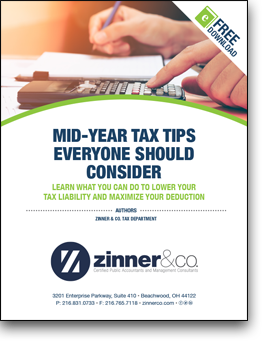Thinking about income taxes should not just be an end-of-year or pre-April-15-panic occurrence. The well-informed taxpayer will think about these seven mid-year tax tips that could help save on his next income tax filing, as well as yours.
If you are like many taxpayers, you received a large income tax refund. According to an article by SmartAsset, the average refund for an Ohio taxpayer was $2,466. Receiving a large refund or paying hundreds or thousands of dollars in income tax are both indicators to take a closer look at your tax withholding. Fortunately, making a mid-year (or any time of the year) change is as simple as filing a new W-4 with your employer.
FREE EBOOK --------------------------------------------------->>>
Related read: I Just Received a Huge Tax Refund! Why this may not be a good thing to brag about.
- Finish and file your 2016 return
For taxpayers who filed an extension in April, the clock is slowly ticking.
Taxpayers have until October 16 to file with the IRS. However, waiting until the last few days may result in overlooked credits, deductions, or unforeseen issues that could arise with technology, thus interfering with your ability to file on time. Allow enough time to finish your return and avoid the rush and panic.
- Evaluate your estimated taxes
One can walk a fine line when it comes to tax estimation. You do not want to overpay your estimated tax, yet, if you owe too much at filing time, you could face a tax penalty. In addition to routine year-end tax planning, we work closely with our clients at the mid-year point to assess their tax situation. We will forecast and project tax obligations, running several scenarios based on one’s situation to help craft a tax strategy that is both meaningful and manageable. This is especially helpful heading into September and January when estimated tax payments are due.
Related read: Pay Me Now, Pay Me Later: Should you pay quarterly estimates or utilize tax withholding?
- Give to charity
Many only think of charitable giving when spring-cleaning, after receiving a solicitation in the mail or online, or in a mad rush at the end of the year to add to the “yes” checkbox for a charitable contribution.
Summer is a great time to make that financial contribution or donate unwanted goods; just remember to obtain a receipt for any item or amount donated, and keep it in a handy place to show proof come tax-filing time. The IRS now requires documentation for every monetary charitable gift, regardless of how small or large. Without it, the IRS may disallow your deduction.
Related read: Ten Tips for Charitable Taxpayers
- Hold on to day camp receipts
Parents claiming the child and dependent care credit often forget that in addition to traditional daycare expenses, summer camp also counts toward the childcare credit. Keep in mind, however, this only applies to day camps, not overnight camps.
Related read: If Your Kids Attended Summer Camp, You Could Save on Your Taxes
- Save your medical receipts
Taxpayers who have medical and dental expenses totaling more than 10% of their Adjusted Gross Income (AGI) can an itemized deduction for those costs. In addition to commonly known expenses, such as co-pays, deductibles, and co-insurance costs, other qualified medical related costs could add to the tally. The IRS guidelines of qualified medical and dental expenses.
- Contribute to your retirement plan
It’s never too late to begin contributing to your retirement plan. If your employer offers a 401(k) with a match and you are not in that plan, realize that you are turning down ‘free’ money. Your employer can update you as to enrollment timelines. For those already in a 401(k) plan, consider increasing the amount of our contribution. The contribution from your paycheck is pre-tax, meaning you will already begin to reduce the amount of your AGI and, as such, reduce your tax obligation.
We also work with clients who are unsure of which retirement option is best; a traditional IRA or a Roth account. Now is the time to determine which makes more sense for your situation and move from one account to another, if or when it makes.
- Hire a tax professional
Oftentimes, taxpayers wait until tax season to think about retaining a qualified CPA firm. There are many software programs on the market that will help taxpayers prepare a tax return. However, a CPA firm with credentialed professionals and specialized services can help folks discover strategies for reducing their tax obligation in the current and subsequent years.
Our practitioners work closely with many industry sources to stay up-to-date on the latest changes in tax laws, and have the ability to evaluate the projected tax effects of many different financial scenarios.
If you would like our help evaluating your tax situation or have questions about these tax tips, contact the professionals in our tax team at info@zinnerco.com or at 216.831.0733. We are happy to help and ready to start the conversation.






